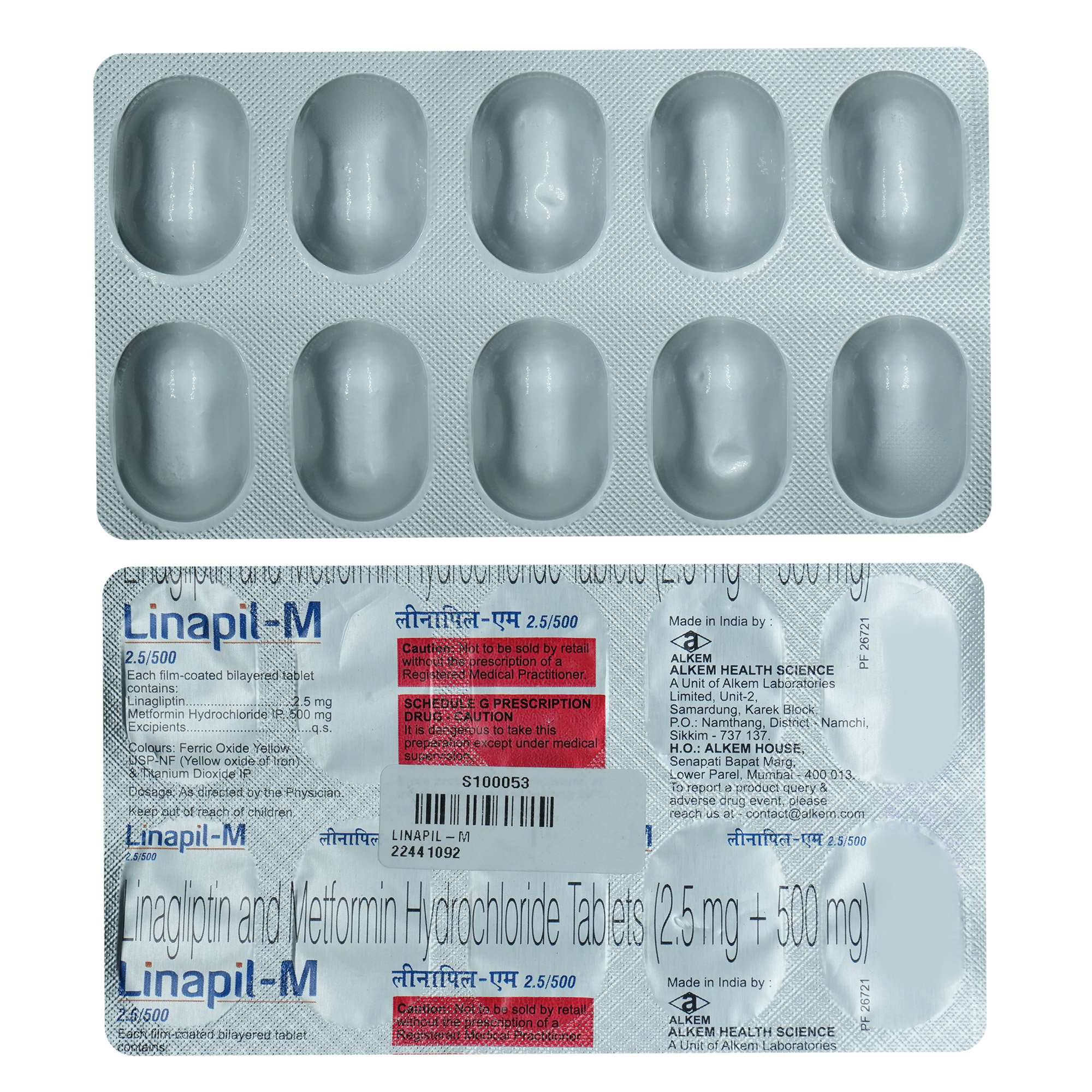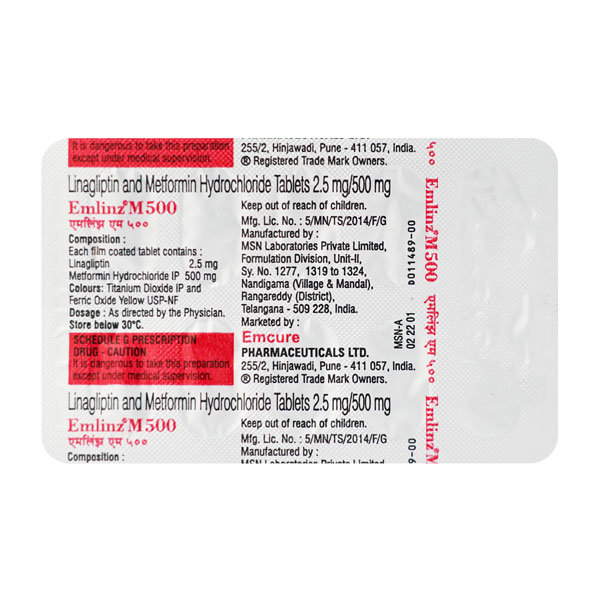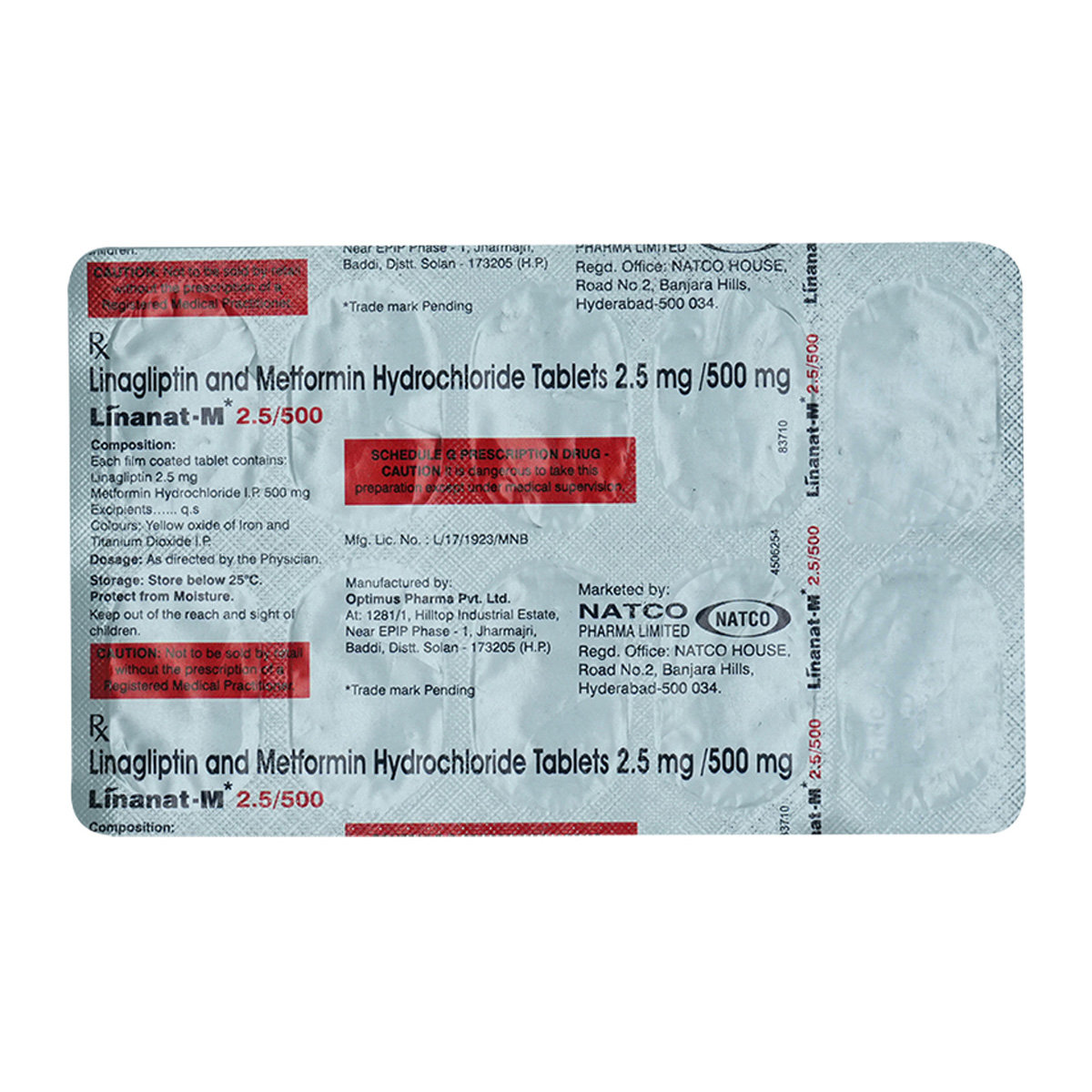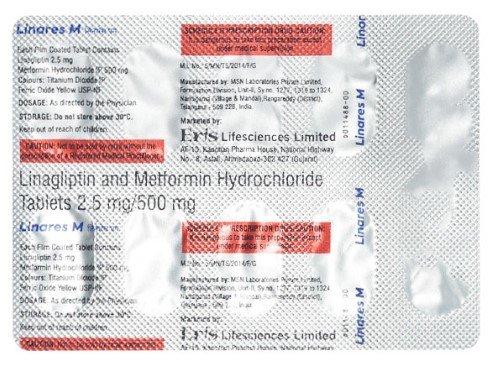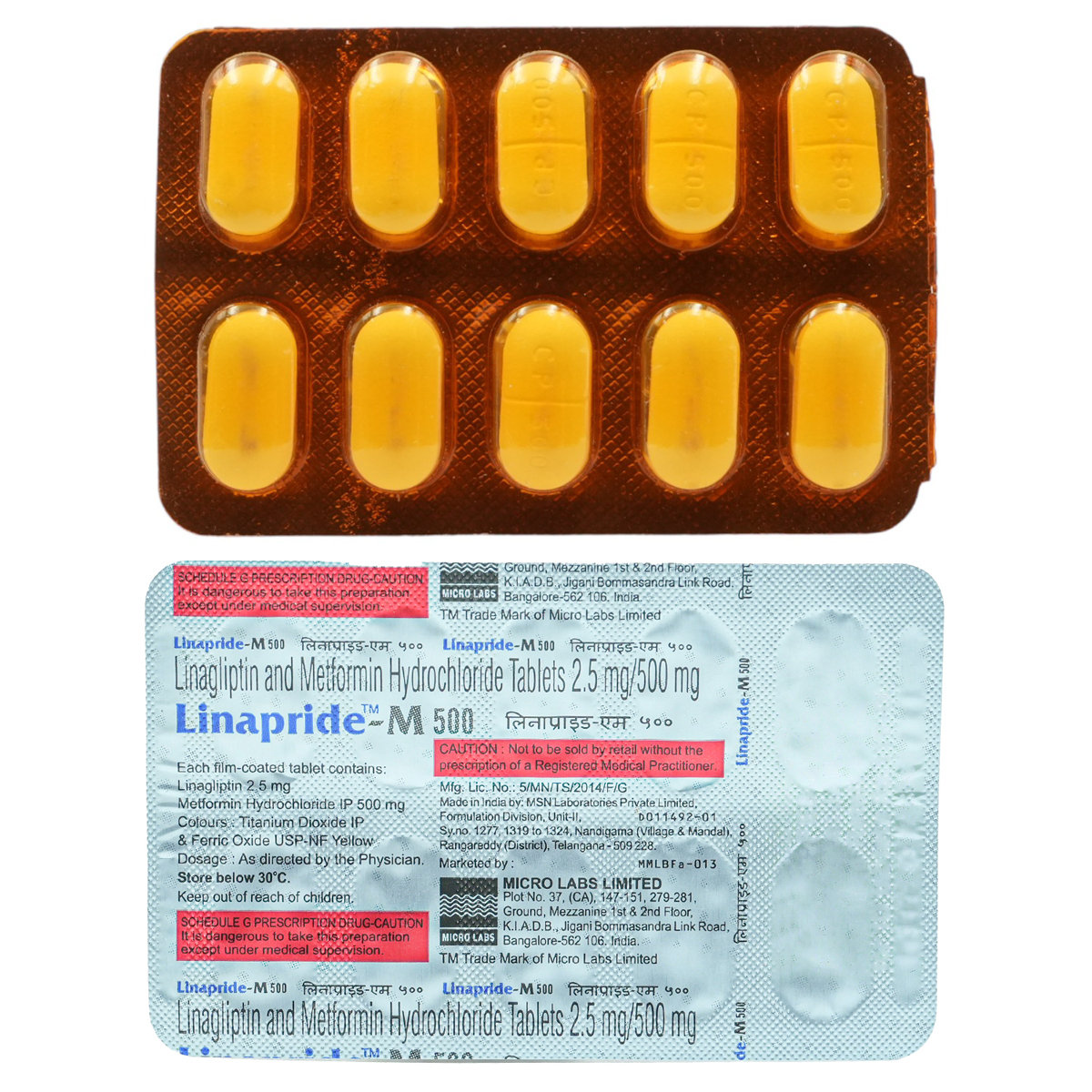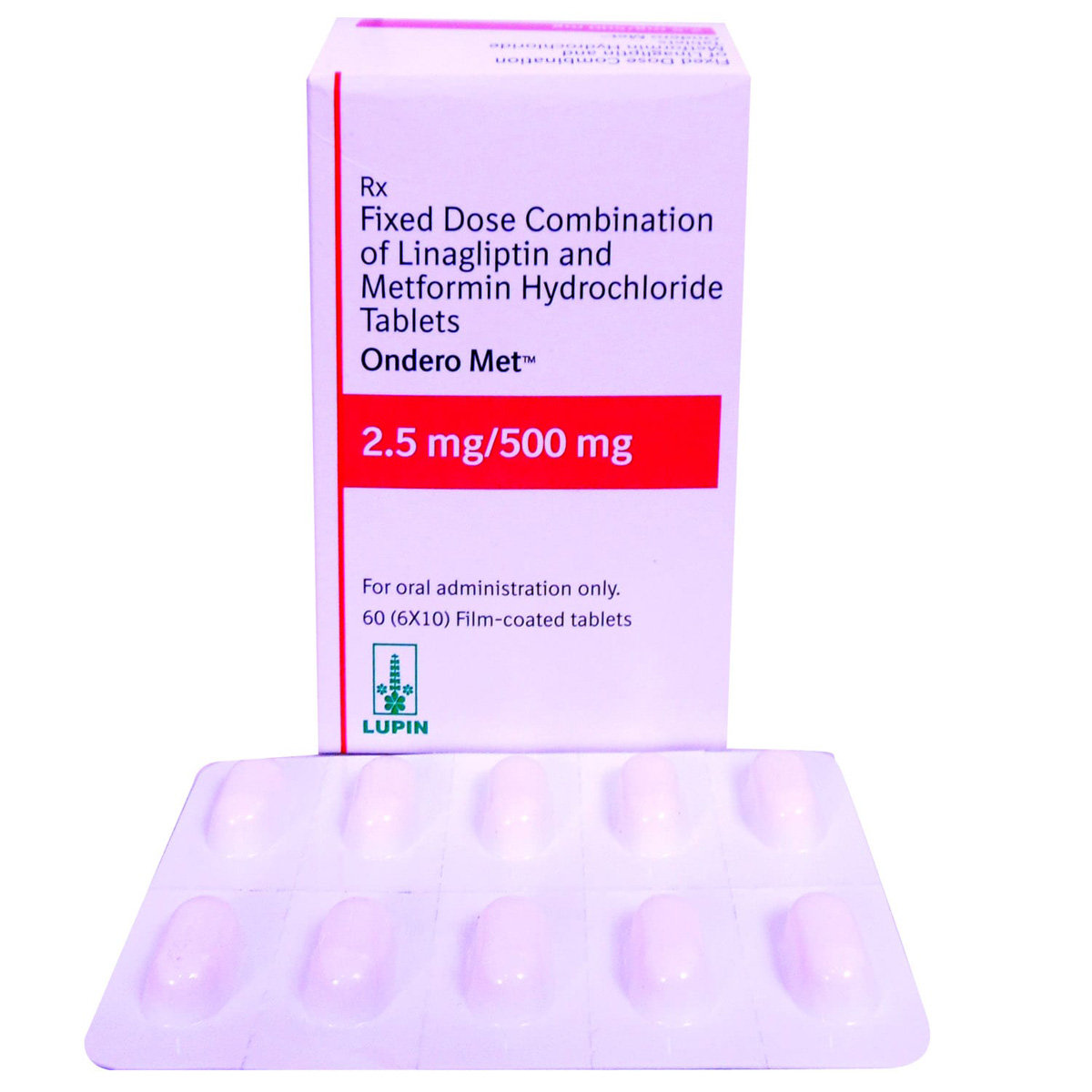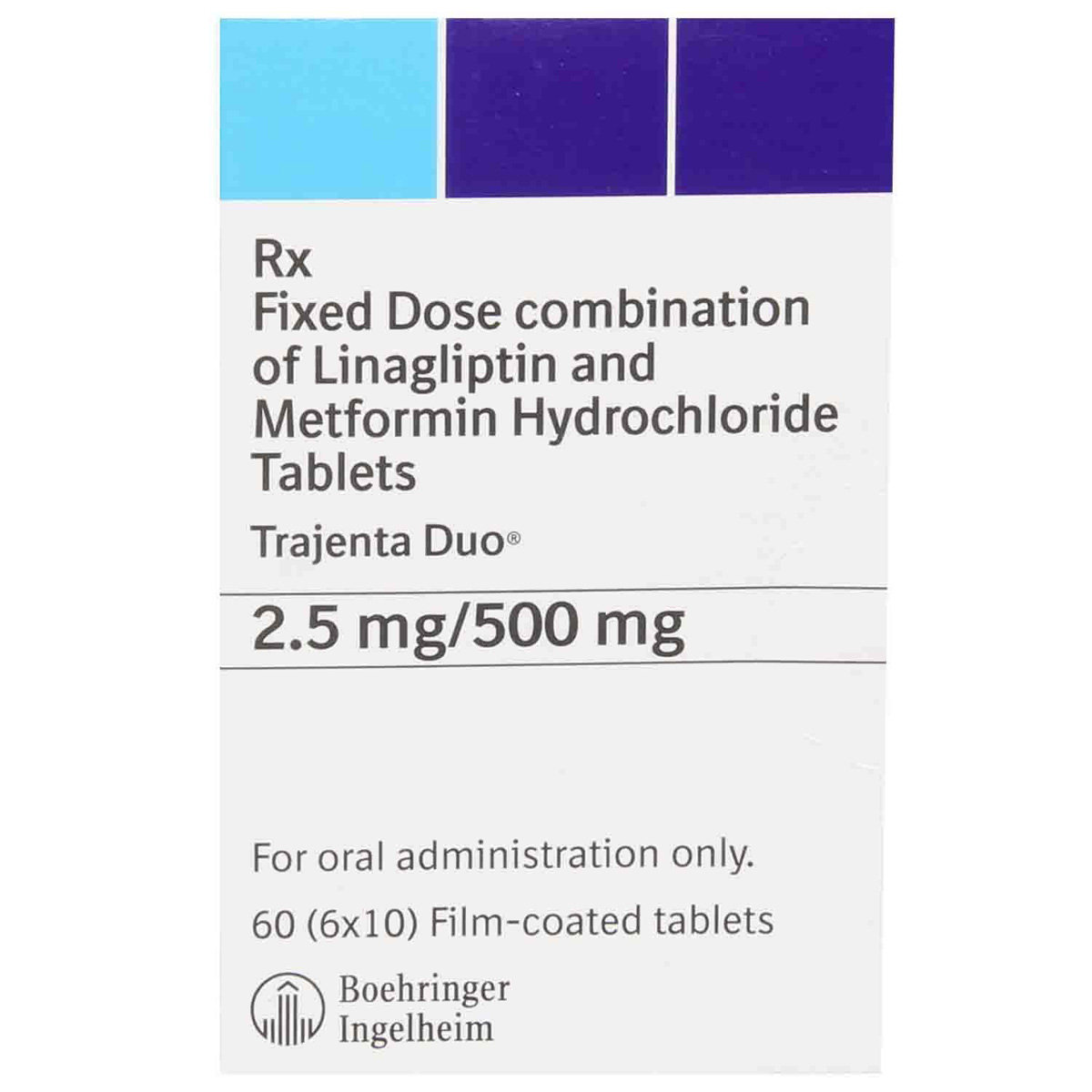Linaray M 2.5 Tablet 15's
MRP ₹140.5
(Inclusive of all Taxes)
₹21.1 Cashback (15%)
Provide Delivery Location
Online payment accepted
 Prescription drug
Prescription drugWhats That
Composition :
Manufacturer/Marketer :
Consume Type :
Return Policy :
About Linaray M 2.5 Tablet 15's
Linaray M 2.5 Tablet 15's is a combination drug of Linagliptin (DPP4 inhibitors) and Metformin (Biguanides) belongs to the anti-diabetic class. Type 2 diabetes is a condition in which either the body stops producing enough insulin (the hormone which helps to decrease sugar levels in the blood) or resistance to insulin action. As a result, insulin is produced in large amounts but cannot act on the body's organs.
Linaray M 2.5 Tablet 15's contains Linagliptin (DPP4 inhibitors) and Metformin (Biguanide). Linagliptin is a dipeptidyl peptidase-4 (DPP-4) inhibitor that blocks the action of DPP-4, an enzyme that destroys the hormone incretin that helps the body produce more insulin only when required. It also reduces the amount of sugar produced by the liver when not needed. Metformin functions by lowering glucose production in the liver, delaying glucose absorption from the intestines and increasing the body's sensitivity to insulin. Together, it prevents blood glucose levels from rising to very high levels after meals.
Linaray M 2.5 Tablet 15's should be taken with food to avoid an upset stomach. Linaray M 2.5 Tablet 15's should be taken at the same time of the day each time for the best results. Your doctor will decide what dose should be taken for better advice, which can change quickly depending on your condition. The most common side effect of Linaray M 2.5 Tablet 15's is hypoglycemia (low blood glucose levels) characterized by dizziness, sweating, palpitations, hunger pangs, dry mouth, skin, etc. So to avoid hypoglycemia, you should not miss meals and should carry some form of sugar along with you. Other side effects include taste change, nausea, diarrhoea, stomach pain, headache, and upper respiratory symptoms.
Linaray M 2.5 Tablet 15's should not be stopped even if you feel better without consulting your doctor as the sugar level keeps changing. If you stop taking Linaray M 2.5 Tablet 15's abruptly, it may increase your sugar levels which could further increase the risk of eyesight loss (retinopathy), kidney (nephropathy), and nerve damage (neuropathy). Linaray M 2.5 Tablet 15's should not be taken if you have type 1 diabetes mellitus or severe kidney or liver disease. Please inform your doctor if you have heart disease or are planning to get pregnant or breastfeed.
Uses of Linaray M 2.5 Tablet 15's
Directions for Use
Key Benefits
Linaray M 2.5 Tablet 15's helps your pancreas produce more insulin, make effective insulin utilization, and decrease the excess sugar that your liver makes. It helps control the rise of blood sugar levels in your body after a meal. Besides this, it does not cause weight gain in prolonged use. Linaray M 2.5 Tablet 15's plays a vital role in controlling blood sugar levels and prevents serious complications of diabetes like eyesight loss (retinopathy), kidney (nephropathy), nerve damage (neuropathy), diabetic foot ulcer, and delayed wound healing.
Storage
Drug Warnings
Linaray M 2.5 Tablet 15's should not be used in patients with type 1 diabetes or with diabetic ketoacidosis. Some diabetic patients, while taking Linaray M 2.5 Tablet 15's, might develop a rare but serious condition called lactic acidosis. In this condition, there is too much lactic acid accumulated in the blood that can damage the working of your liver and kidney required for the elimination of excess lactic acid from the blood. Before you start taking Linaray M 2.5 Tablet 15's, tell your doctor if you’ve ever had pancreatitis (inflammation of the pancreas), kidney disease, and low vitamin B12 level. Linaray M 2.5 Tablet 15's, when used with insulin, may extremely lower the blood sugar level leading to hypoglycemia condition, which can be fatal. Your doctor may adjust the dose by lowering the dose of insulin or Linaray M 2.5 Tablet 15's in this case. A prolonged intake of Linaray M 2.5 Tablet 15's may lower your thyroid-stimulating hormone (TSH); hence, TSH's annual check-up is recommended. You may also develop a serious skin reaction known as bullous pemphigoid that requires immediate medical attention in rare cases. Tell your doctor if you will have a diagnostic test with an injection of dye or X-ray contrast agent. The use of Linaray M 2.5 Tablet 15's should be stopped for a short time before having an X-ray procedure.
Diet & Lifestyle Advise
- Fill your half plate with starchy veggies, a quarter with proteins, and a quarter with whole grain.
- Eat at regular intervals. Do not take a long gap between a meal or snack.
- Monitor your blood sugar level regularly, especially when there are lots of fluctuations.
- Invest at least 150 minutes of moderate-intensity physical activity or one hour and 15 minutes of high-intensity exercise weekly.
- Lose weight gradually to achieve a healthy body mass index (18.5 to 24.9).
- Replace refined carbohydrates containing whole-grain foods and increase the intake of fruits, veggies, and other fibre-enriched foods.
- Reduce saturated fat (or hidden fats) intake in food like chips, crisps, pastries, biscuits, and samosas. Choose omega-3 fatty acid-containing oils for daily cooking. For frying, you can use palm oil, mustard oil, groundnut oil, rice bran oil, and safflower oil.
- Do not take stress as it may elevate your blood sugar level. You can adopt stress management techniques like mindfulness to control stress-related blood sugar changes.
- Opt for low-fat dairy products (low-fat yoghurt, fat-free milk, cheese, etc.).
- Keep your blood pressure as normal (140/90) as possible as it reduces the risk of cardiovascular diseases in diabetes patients.
Side Effects of Linaray M 2.5 Tablet 15's
- Low blood sugar
- Runny nose
- Sore throat
- Upper lung infection
- Diarrhoea
- Nausea
- Vomiting
- Gas
- Stomach upset
- Indigestion,
- General weakness
- Headache
Habit Forming
Therapeutic Class
All Substitutes & Brand Comparisons
RX
Juslina-M 2.5 mg/500 mg Tablet 10's
Mankind Pharma Pvt Ltd
₹71
(₹6.39 per unit)
31% CHEAPERRX
Dynaglipt-LM 2.5/500 Tablet 10's
Mankind Pharma Pvt Ltd
₹72
(₹6.49 per unit)
30% CHEAPERRX
Linero M 500 Tablet 10's
Intas Pharmaceuticals Ltd
₹84.5
(₹7.61 per unit)
18% CHEAPER
FAQs
Drug-Drug Interactions Checker List
- ASPIRIN
- CIPROFLOXACIN
- CIMETIDINE
- DIGOXIN
- AMLODIPINE
- TOPIRAMATE
- LAMOTRIGINE
- BUPROPION
- CEPHALEXIN
- RANOLAZINE
- DOLUTEGRAVIR
- VERAPAMIL
Disease/Condition Glossary
Type 2 diabetes is a condition where the body cannot make sufficient insulin, or the insulin that it makes doesn't work properly or is utilized by our body. This can cause high blood sugar levels (hyperglycemia). Type 2 diabetes symptoms include increased thirst, frequent urination at night, slow wound healing, increased hunger, fatigue, and blurred vision. There may be weight gain in some cases, while weight loss may be observed in rare cases. The complication of type 2 diabetes also includes neuropathy (nerve problems), nephropathy (kidney problems), and retinopathy (damaged retina of eyes or blindness), loss of limbs, sexual dysfunction, and increase the chance of heart attack or stroke.

Have a query?
Alcohol
Safe if prescribed
It is best to avoid alcohol while taking Linaray M 2.5 Tablet 15's.
Pregnancy
Consult your doctor
Please consult your doctor for advice before using Linaray M 2.5 Tablet 15's.
Breast Feeding
Consult your doctor
Please consult your doctor for advice before using Linaray M 2.5 Tablet 15's.
Driving
Safe if prescribed
Drive only if you are physically stable and mentally focussed; if you experience drowsiness after taking these medications, you should not drive or operate any machinery or vehicles.
Liver
Consult your doctor
If u have or had a history or evidence of any liver-related diseases, please consult the doctor before taking medicine.
Kidney
Consult your doctor
If u have or had a history or evidence of any kidney-related diseases, please consult the doctor before taking medicine.
Children
Safe if prescribed
It is advisable to consult a doctor before using it.








